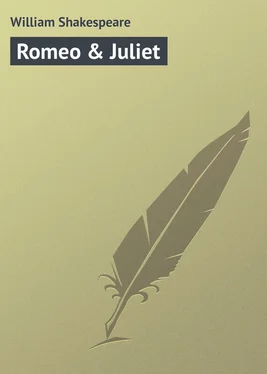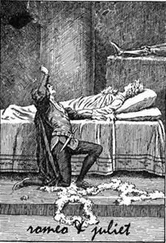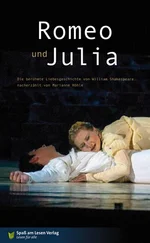William Shakespeare - Romeo & Juliet
Здесь есть возможность читать онлайн «William Shakespeare - Romeo & Juliet» — ознакомительный отрывок электронной книги совершенно бесплатно, а после прочтения отрывка купить полную версию. В некоторых случаях можно слушать аудио, скачать через торрент в формате fb2 и присутствует краткое содержание. Год выпуска: 0101, Жанр: foreign_antique, foreign_prose, на английском языке. Описание произведения, (предисловие) а так же отзывы посетителей доступны на портале библиотеки ЛибКат.
- Название:Romeo & Juliet
- Автор:
- Жанр:
- Год:0101
- ISBN:нет данных
- Рейтинг книги:3 / 5. Голосов: 1
-
Избранное:Добавить в избранное
- Отзывы:
-
Ваша оценка:
- 60
- 1
- 2
- 3
- 4
- 5
Romeo & Juliet: краткое содержание, описание и аннотация
Предлагаем к чтению аннотацию, описание, краткое содержание или предисловие (зависит от того, что написал сам автор книги «Romeo & Juliet»). Если вы не нашли необходимую информацию о книге — напишите в комментариях, мы постараемся отыскать её.
Romeo & Juliet — читать онлайн ознакомительный отрывок
Ниже представлен текст книги, разбитый по страницам. Система сохранения места последней прочитанной страницы, позволяет с удобством читать онлайн бесплатно книгу «Romeo & Juliet», без необходимости каждый раз заново искать на чём Вы остановились. Поставьте закладку, и сможете в любой момент перейти на страницу, на которой закончили чтение.
Интервал:
Закладка:
William Shakespeare
Romeo and Juliet
Dramatis Personae
• ESCALUS prince of Verona. • PARIS a young nobleman, kinsman to the prince. • MONTAGUE, CAPULET} heads of two houses at variance with each other. • An old man, cousin to Capulet. • ROMEO son to Montague. • MERCUTIO kinsman to the prince, and friend to Romeo. • BENVOLIO nephew to Montague, and friend to Romeo. • TYBALT nephew to Lady Capulet. • FRIAR LAURENCE, FRIAR JOHN} Franciscans. • BALTHASAR servant to Romeo. • SAMPSON, GREGORY} servants to Capulet. • PETER servant to Juliet’s nurse. • ABRAHAM servant to Montague. • An Apothecary. • Three Musicians. • Page to Paris; another Page; an officer. • LADY MONTAGUE wife to Montague. • LADY CAPULET wife to Capulet. • JULIET daughter to Capulet. • Nurse to Juliet. • Citizens of Verona; several Men and Women, relations to both houses; Maskers, Guards, Watchmen, and Attendants. • Chorus.
Scene: Verona: Mantua.
Prologue
Two households, both alike in dignity, In fair Verona, where we lay our scene, From ancient grudge break to new mutiny, Where civil blood makes civil hands unclean. From forth the fatal loins of these two foes A pair of star-cross’d lovers take their life; Whose misadventured piteous overthrows Do with their death bury their parents’ strife. The fearful passage of their death-mark’d love, And the continuance of their parents’ rage, Which, but their children’s end, nought could remove, Is now the two hours’ traffic of our stage; The which if you with patient ears attend, What here shall miss, our toil shall strive to mend.
Act 1
Scene 1
Verona. A public place.
Enter SAMPSON and GREGORY, of the house of Capulet, armed with swords and bucklers
SAMPSON:
Gregory, o’ my word, we’ll not carry coals.
GREGORY:
No, for then we should be colliers.
SAMPSON:
I mean, an we be in choler, we’ll draw.
GREGORY:
Ay, while you live, draw your neck out o’ the collar.
SAMPSON:
I strike quickly, being moved.
GREGORY:
But thou art not quickly moved to strike.
SAMPSON:
A dog of the house of Montague moves me.
GREGORY:
To move is to stir; and to be valiant is to stand: therefore, if thou art moved, thou runn’st away.
SAMPSON:
A dog of that house shall move me to stand: I will take the wall of any man or maid of Montague’s.
GREGORY:
That shows thee a weak slave; for the weakest goes to the wall.
SAMPSON:
True; and therefore women, being the weaker vessels, are ever thrust to the wall: therefore I will push Montague’s men from the wall, and thrust his maids to the wall.
GREGORY:
The quarrel is between our masters and us their men.
SAMPSON:
’Tis all one, I will show myself a tyrant: when I have fought with the men, I will be cruel with the maids, and cut off their heads.
GREGORY:
The heads of the maids?
SAMPSON:
Ay, the heads of the maids, or their maidenheads; take it in what sense thou wilt.
GREGORY:
They must take it in sense that feel it.
SAMPSON:
Me they shall feel while I am able to stand: and ’tis known I am a pretty piece of flesh.
GREGORY:
’Tis well thou art not fish; if thou hadst, thou hadst been poor John. Draw thy tool! here comes two of the house of the Montagues.
SAMPSON:
My naked weapon is out: quarrel, I will back thee.
GREGORY:
How! turn thy back and run?
SAMPSON:
Fear me not.
GREGORY:
No, marry; I fear thee!
SAMPSON:
Let us take the law of our sides; let them begin.
GREGORY:
I will frown as I pass by, and let them take it as they list.
SAMPSON:
Nay, as they dare. I will bite my thumb at them; which is a disgrace to them, if they bear it.
Enter ABRAHAM and BALTHASAR
ABRAHAM:
Do you bite your thumb at us, sir?
SAMPSON:
I do bite my thumb, sir.
ABRAHAM:
Do you bite your thumb at us, sir?
SAMPSON:
[Aside to GREGORY]
Is the law of our side, if I say ay?
GREGORY:
No.
SAMPSON:
No, sir, I do not bite my thumb at you, sir, but I bite my thumb, sir.
GREGORY:
Do you quarrel, sir?
ABRAHAM:
Quarrel sir! no, sir.
SAMPSON:
If you do, sir, I am for you: I serve as good a man as you.
ABRAHAM:
No better.
SAMPSON:
Well, sir.
GREGORY:
Say ’better:’ here comes one of my master’s kinsmen.
SAMPSON:
Yes, better, sir.
ABRAHAM:
You lie.
SAMPSON:
Draw, if you be men. Gregory, remember thy swashing blow.
They fight
Enter BENVOLIO
BENVOLIO:
Part, fools! Put up your swords; you know not what you do.
Beats down their swords
Enter TYBALT
TYBALT:
What, art thou drawn among these heartless hinds? Turn thee, Benvolio, look upon thy death.
BENVOLIO:
I do but keep the peace: put up thy sword, Or manage it to part these men with me.
TYBALT:
What, drawn, and talk of peace! I hate the word, As I hate hell, all Montagues, and thee: Have at thee, coward!
They fight
Enter, several of both houses, who join the fray; then enter Citizens, with clubs
First Citizen:
Clubs, bills, and partisans! strike! beat them down! Down with the Capulets! down with the Montagues!
Enter CAPULET in his gown, and LADY CAPULET
CAPULET:
What noise is this? Give me my long sword, ho!
LADY CAPULET:
A crutch, a crutch! why call you for a sword?
CAPULET:
My sword, I say! Old Montague is come, And flourishes his blade in spite of me.
Enter MONTAGUE and LADY MONTAGUE
MONTAGUE:
Thou villain Capulet,-Hold me not, let me go.
LADY MONTAGUE:
Thou shalt not stir a foot to seek a foe.
Enter PRINCE, with Attendants
PRINCE:
Rebellious subjects, enemies to peace, Profaners of this neighbour-stained steel,- Will they not hear? What, ho! you men, you beasts, That quench the fire of your pernicious rage With purple fountains issuing from your veins, On pain of torture, from those bloody hands Throw your mistemper’d weapons to the ground, And hear the sentence of your moved prince. Three civil brawls, bred of an airy word, By thee, old Capulet, and Montague, Have thrice disturb’d the quiet of our streets, And made Verona’s ancient citizens Cast by their grave beseeming ornaments, To wield old partisans, in hands as old, Canker’d with peace, to part your canker’d hate: If ever you disturb our streets again, Your lives shall pay the forfeit of the peace. For this time, all the rest depart away: You Capulet; shall go along with me: And, Montague, come you this afternoon, To know our further pleasure in this case, To old Free-town, our common judgment-place. Once more, on pain of death, all men depart.
Exeunt all but MONTAGUE, LADY MONTAGUE, and BENVOLIO
MONTAGUE:
Who set this ancient quarrel new abroach? Speak, nephew, were you by when it began?
BENVOLIO:
Here were the servants of your adversary, And yours, close fighting ere I did approach: I drew to part them: in the instant came The fiery Tybalt, with his sword prepared, Which, as he breathed defiance to my ears, He swung about his head and cut the winds, Who nothing hurt withal hiss’d him in scorn: While we were interchanging thrusts and blows, Came more and more and fought on part and part, Till the prince came, who parted either part.
LADY MONTAGUE:
O, where is Romeo? saw you him to-day? Right glad I am he was not at this fray.
Читать дальшеИнтервал:
Закладка:
Похожие книги на «Romeo & Juliet»
Представляем Вашему вниманию похожие книги на «Romeo & Juliet» списком для выбора. Мы отобрали схожую по названию и смыслу литературу в надежде предоставить читателям больше вариантов отыскать новые, интересные, ещё непрочитанные произведения.
Обсуждение, отзывы о книге «Romeo & Juliet» и просто собственные мнения читателей. Оставьте ваши комментарии, напишите, что Вы думаете о произведении, его смысле или главных героях. Укажите что конкретно понравилось, а что нет, и почему Вы так считаете.












